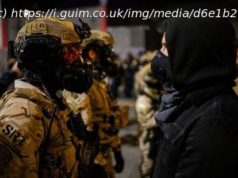The death toll is still rising after the deadliest terrorist attack in Somali’s history.
More than 500 people were killed or seriously injured in a pair of truck bombings in Somalia on Saturday, in what will likely end up being one of the world’s deadliest terrorist attacks since 9/11. Two truck bombs were detonated in the densely populated heart of Mogadishu, demolishing nearby buildings, crushing cars and buses, and leaving more than a city block littered with the dead and injured. The first bomb was the most deadly, set off outside the popular Safari Hotel near Somalia’s foreign ministry in Mogadishu’s Hodan district. A second bomb was then detonated nearby in the city’s Madina district.
The official death total was at least 276 as of Sunday, but the toll is expected to rise significantly as rescue workers continue to dig through the rubble and recover more bodies. Most were killed at the site of the first bombing, where a large truck packed with military-grade and homemade explosives blew up amid a traffic jam and an area packed with pedestrians. Many victims recovered from the scene, alive and dead, were burned beyond recognition, and some victims may never be found at all because they were incinerated by the heat of the enormous blast or the building fires that followed. The Safari Hotel collapsed under the force of the bombing, and at least one report indicated that some people may have been initially trapped inside. Some Somali government officials were reportedly killed in the attacks as well, including the director of the country’s Ministry of Humanitarian Affairs.
Casualties from the blast overwhelmed the city’s hospitals, while residents descended on the scene of the attack to search for missing loved ones. Local reports indicate that at least 300 people were injured, and Mogadishu residents were lining up on Sunday to donate blood in an attempt to help the wounded.
The affiliated Somali militant group al-Shabaab is being blamed for the attack, but no one has claimed responsibility for the bombings yet. The Islamist group, which has been affiliated with Al Qaeda and is considered the deadliest terrorist organization in Africa, has been fighting a civil war with the often fragile Somali government since 2007. It had recently stepped up its attacks on Somali army bases, and Somali, African Union, and U. S. forces have escalated their efforts to combat the group this year. That has included an increase in U. S. drone strikes after President Trump expanded the America’s counterterrorism campaign in the country and loosened the rules of engagement for U. S. forces.
The Trump administration has characteristically refused to detail what that escalation has actually meant as far as the number of additional military resources or U. S. personnel on the ground. The Washington Post estimates no more than a few hundred Americans are involved in that effort, but a U. S. Navy Seal was killed west of Mogadishu earlier this year during a battle with militants, the first U. S. service member to be killed in the country since the 90s.
So far, combined efforts have clearly not been effective at eliminating the group, which has repeatedly targeted civilian areas in Mogadishu and shown little sign of weakening despite losses of leadership and territory. The country has also been facing a devastating famine.
Somalia’s president, Mohamed Abdullahi Mohamed, declared three days of national mourning in response to the attack. “Today’s horrific attack proves our enemy would stop nothing to cause our people pain and suffering,” he said, adding that it was “time to unite and pray together. Terror won’t win.”
The U. S. Mission to Somalia released a statement condemning the bombings, calling the attacks “cowardly” and insisting that the U. S. is more committed than ever to assisting Somali and African Union authorities in their fight against terrorism.






